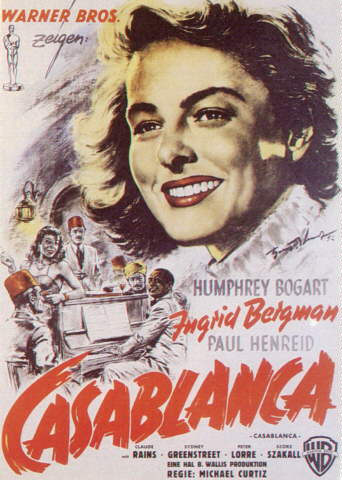 But
the film represents much more. It depicts Americans in the
forties, my mother and father, and the way they preferred to think
about themselves; when Ilsa walks back into Rick's life, the
American character (in a time of war) crystallizes: when
circumstances demand heroism, Americans get tough on the outside
and moral within, capable of sacrifice and romance and rugged
individualism, shaping democracy, sticking their neck out. Rick's
Café, in itself, exalts the power of American diversity and
the guarded optimism located in America in the forties.
But
the film represents much more. It depicts Americans in the
forties, my mother and father, and the way they preferred to think
about themselves; when Ilsa walks back into Rick's life, the
American character (in a time of war) crystallizes: when
circumstances demand heroism, Americans get tough on the outside
and moral within, capable of sacrifice and romance and rugged
individualism, shaping democracy, sticking their neck out. Rick's
Café, in itself, exalts the power of American diversity and
the guarded optimism located in America in the forties.
The film also reveals the powerful liaison between Hollywood and the U. S. government, in that Jack Warner and the Office of War Information (OWI) produced films to shape the morale and attitudes of our nation as we entered WW II. As propaganda Casablanca shows a transformation of thought within the American political landscape; the hero, Rick Blaine, moves from a position of isolationism at the beginning of the film to a heroic belief in interventionism. When we first encounter Bogart, he is a cynical and self-absorbed tough guy, retreating from the Nazis and a broken love affair to Casablanca in the African desert. In the end, Bogie is self-sacrificing and committed to the fight against Nazi aggression. He outwits Captain Renault in a way that is synonymous to the trickery of Odysseus and he outguns Strasser in a way that recalls an old west shoot-out. Strasser goes for his gun first and even dies beside a buckboard wagon. As Umberto Eco puts it, "It is not one movie. It is movies." The implication? Hollywood mythopoeia, the American hero thinking for everyone--for Americans--in a time of War.
And all this thinking "adds up to one thing." Bogie gives up the woman he loves in the high mimetic style of the Roman hero Aeneas. And he does it with words that echo Jove's decree about destiny and duty in the final book of the Aeneid. At the airport, Bogart says to Elsa, "The problems of three little people don't amount to a hill of beans in this crazy world." Bogie perhaps starts out as a Greek-style hero but ends up a model Roman. One thing seems evident. He symbolizes America's belief about our duty to morality and State in World War II.